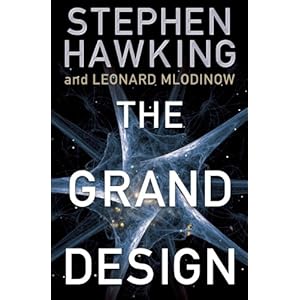 In their new book, “The Grand Design,” Stephen Hawking and co-author Leonard Mlodinow provide a theory that attempts to answer the question, “How did the universe begin?” The answer? Well, it’s definitely not God. In “A Brief History of Time” Hawking allowed for the possibility of God, though he never admitted to believing in one, but in “The Grand Design” the authors write that “their creation does not require the intervention of some supernatural being or god. Rather, these multiple universes arise naturally from physical law. They are a prediction of science.”
In their new book, “The Grand Design,” Stephen Hawking and co-author Leonard Mlodinow provide a theory that attempts to answer the question, “How did the universe begin?” The answer? Well, it’s definitely not God. In “A Brief History of Time” Hawking allowed for the possibility of God, though he never admitted to believing in one, but in “The Grand Design” the authors write that “their creation does not require the intervention of some supernatural being or god. Rather, these multiple universes arise naturally from physical law. They are a prediction of science.”
But that’s not the “real news” about Hawking’s latest work, argues David Garner in The New York Times:
The real news about “The Grand Design” is how disappointingly tinny and inelegant it is. The spare and earnest voice that Mr. Hawking employed with such appeal in “A Brief History of Time” has been replaced here by one that is alternately condescending, as if he were Mr. Rogers explaining rain clouds to toddlers, and impenetrable…. This book is provocative pop science, an exploration of the latest thinking about the origins of our universe. But the air inside this literary biosphere is not especially pleasant to breathe.
(Now, here I’d argue that Mr. Rogers always seemed calm and kind and sincere, never condescending, even to toddlers, but you get the idea.) Garner writes that Hawking’s efforts to provide an “ultimate theory of everything” will ultimately please very few of the very many readers who purchased copies and contributed to the book's rise to the top of Amazon's bestseller list. For Garner, not only is M-theory a disappointment—he calls it a “patchwork quilt rather than a fine, seamless garment”—but so are the authors’ attempts at science-based humor:
“If you think it is hard to get humans to follow traffic laws,” we read, “imagine convincing an asteroid to move along an ellipse.” (Oh, my.)
In the end, Garner wonders whether it's really necessary to pair science and religion in the first place:
The arguments in “The Grand Design”—especially those about why God isn’t necessary to imagine the beginning of the universe—put me in mind of something [science-writer Timothy] Ferris said in his excellent book “The Whole Shebang” (1997).
“Religious systems are inherently conservative, science inherently progressive,” Mr. Ferris wrote. Religion and science don’t have to be hostile to each other, but we can stop setting them up on blind dates. “This may be an instance,” Mr. Ferris added, “where good walls make good neighbors.”
Pope Benedict XVI is among many who have already weighed in on this matter. What are your thoughts?








In reality, it is the atheist who believes in fairy tales. They actually believe in nothing and abhor anyone who believes in something. Their immediate instinct is to strike out at whatever you believe, especially if it something like the Resurrection, but just the possibility that there is a creator is a non starter with them. They will always describe themselves as both reasonable and one based on reason when in fact they are neither. A typical trick by Christopher Hitchens when defending his atheism is to attack the tenets of Christianity.
I haven't read Hawking' book and do not plan to not because I have anything against it, just that my current list or unread books is approaching 20.
http://www.firstthings.com/onthesquare/2010/09/much-ado-about-ldquonothingrdquo-stephen-hawking-and-the-self-creating-universe
It is from First Things. Barr is a Catholic cosmologist.